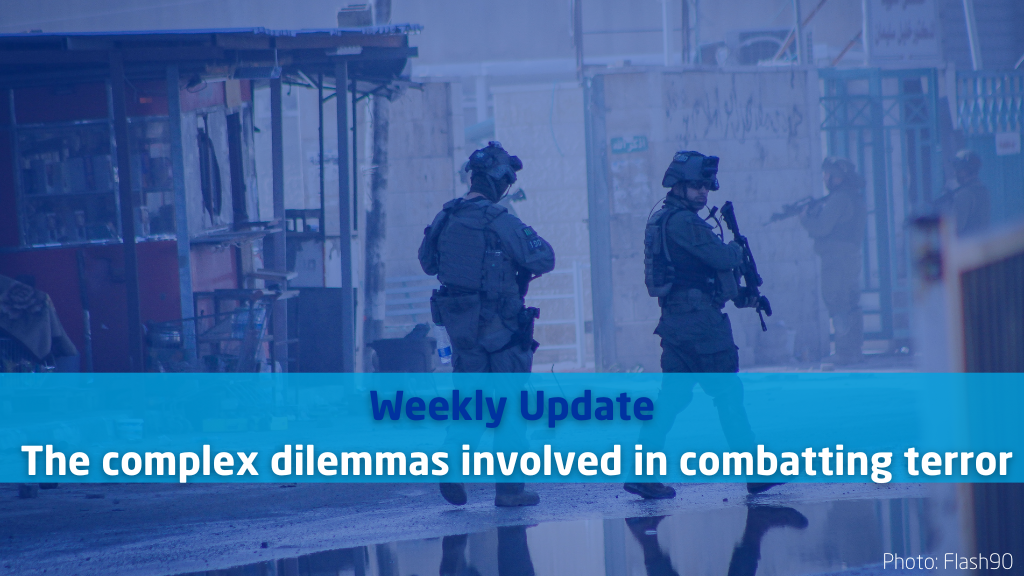The complex dilemmas involved in combatting terror
Since its creation in 1948, Israel has been fighting for its existence. For the first decades, this was a war with the surrounding (mainly Sunni) Arab states. More recently, it has been facing the use of terror and violence sponsored by Islamist regimes, principally of Iran and Qatar.
Iran and Qatar continue their campaign to undermine and destroy the Jewish state, by sponsoring and hosting terror organizations like Hamas and Hezbollah, operating in all of Israel’s neighboring territory: including Gaza, the West Bank, Lebanon, Syria, and Jordan.
It must be remembered that Israel is engaged in a multi-front war. The horrendous invasion of Israel from Gaza, and the ensuing brutalities on 7th October, was part of this war.
In deciding how to respond to the 7th October attacks, Israel had two fundamental and entirely legitimate concerns: to recover the more than 200 hostages held by Hamas, and to prevent the possibility of further attacks on Israeli citizens. Every civilized country would share those aims. It faced several alternatives, each of which had high risks and costs involved. First, it could have ignored the fact that it had been attacked. This would have exposed it to ongoing attacks and the likelihood of worse brutalities. Clearly this was never an option. Second, it could have decided to continue the policy it had in place for over a decade since Hamas came into power in 2007 – strengthen the blockade, deterring Hamas, but not destroying it (“mowing the lawn”). This was also no longer viable. Third, it could have decided to try to create an international coalition to confront and eliminate the threate emanating from Hamas. Or, finally, it could have chosen to develop a response involving use of its armed forces to defend the country by eliminating the threats posed by Hamas and its allies.
With the support of its international allies (including the USA), which all supported Israel’s right to use force (within the limits of international humanitarian law), Israel chose the latter.
But eliminating Hamas’ capabilities has proven much more difficult than expected. And it has come at a huge cost, including massive destruction in Gaza, the high death toll, and the provocation of further extremism in Palestinian society. The conflict started by Hamas has also unleashed a wave of antisemitism worldwide.
And so far, neither the UN nor the international community has done very little to help Israel achieve either of its goals. On the contrary, there is growing pressure on Israel to agree a ceasefilre without either total Hamas surrender or hostage return as a precondition. Even the US refused to veto a Security Council resolution alomg those lines.
There are many who criticize Israel’s conduct of the war. Others, however, such as John Spencer (Chair of urban warfare studies at the Modern War Institute (MWI) at West Point, who served for 25 years as an infantry soldier and two tours in Iraq) argue that Israel is setting a uniquely high standard to prevent civilian harm in the context of a complex urban warfare, facing an enemy (Hamas) that is deliberately incites Israel and provokes maximum loss of Palestinian civilian lives –
“The IDF has telegraphed almost every move ahead of time so civilians can relocate, nearly always ceding the element of surprise. This has allowed Hamas to reposition its senior leaders (and the Israel hostages) as needed through the dense urban terrain of Gaza and the miles of underground tunnels it’s built.
Hamas fighters, who unlike the IDF don’t wear uniforms, have also taken the opportunity to blend into civilian populations as they evacuate. The net effect is that Hamas succeeds in its strategy of creating Palestinian suffering and images of destruction to build international pressure on Israel to stop its operations, therefore ensuring Hamas’ survival.”
Spencer concludes:
“Those calling for Israel to find an alternative to inflicting civilian casualties to lower amounts (like zero) should be honest that this alternative would leave the Israeli hostages in captivity and allow Hamas to survive the war. The alternative to a nation’s survival cannot be a path to extinction.”
Collateral loss of life and unintentional killings of civilians are, tragically, an unavoidable consequence of warfare. All the more when the enemy is embedded within the local population.
The situation is all the more complex because of the humanitarian needs of the Palestinians trapped in southern Gaza. Humanitarian organizations are operating in a complex urban warfare environment which Hamas is exploiting. The latest killing of aid workers by the IDF is a shocking example. Seven World Central Kitchen workers were killed this week by an Israeli drone strike that targeted their vehicles.
So far, there is no evidence that Israel deliberately intended to kill aid workers. But it is clearly an incident that should never have happened. Israel has apologized and is investigating the incident.
Nevertheless, the incident has triggered an international outcry and condemnation of Israel’s conduct of the war. It has further worsened the disagreement between the Netanyahu-led Israeli government and the United States – Israel’s most important ally – about its conduct of the war, and Israel’s apparent lack of a clear post-war goal and strategy.
Pressure is also mounting within Israel on Netanyahu and his right-wing government, and many are calling for elections. This past week has seen large demonstrations in Israel against Netanyahu.
Let us pray for the increasingly complex situation within which Israel finds itself. Pray for the hostages still held in Gaza. Pray for Israel’s leadership. Pray for Israel’s enemies. Pray for the Peace of Jerusalem.
The Editorial Team Israel & Christians Today
Israel Has Created a New Standard for Urban Warfare. Why Will No One Admit It? | Opinion
Prof. John Spencer in Newsweek: “In my long career studying and advising on urban warfare for the U.S. military, I’ve never known an army to take such measures to attend to the enemy’s civilian population, especially while simultaneously combating the enemy in the very same buildings. In fact, by my analysis, Israel has implemented more precautions to prevent civilian harm than any military in history—above and beyond what international law requires and more than the U.S. did in its wars in Iraq and Afghanistan.”
> Read more..
Israel’s global isolation is caused by antisemitism, not bad policies
Jonathan Tobin at JNS: “Those who care about Israel must take these lessons to heart and realize that the only solution to its current situation is for Jerusalem to ignore its critics and push through to victory, no matter how difficult that might be in terms of its military and diplomatic challenges. Only by clearly beating the Hamas criminals, as well as their many supporters and enablers, can circumstances ease a little. Anything less and a nightmare scenario envisioned by antisemitic foes—in which Israel truly becomes a pariah state—will be the inevitable result.”
> Read more..
The Biden administration’s war against the government of Israel
Caroline Glick at JNS: “Before Oct. 7, rioters demanded the overthrow of Netanyahu’s coalition due to its “anti-democratic” policies and “corruption.” The new rallying cry is to free the hostages.”
> Read more..
Israel’s Strategic Challenge
Blaise Misztal at JINSA: “For nearly two decades, Israel has eschewed making strategic choices in dealing with the terrorist groups that surround it, relying instead on deterrence to minimize their threat while tolerating their presence. That approach failed on Oct. 7. Currently, Israel appears to be prioritizing the operational objective of clearing Hamas from Gaza. But it cannot afford to avoid grappling with the question of what that failure of deterrence means for its future security.”
> Read more..
Internal Palestinian Rivalry Pushes Israel toward Temporary Military Administration in Gaza
Michael Koby at INSS: “Bitter rivalry—attempts at reconciliation—and a new crisis: This is how the cycle of relations between Fatah and Hamas has looked for many years. It seems that this cycle will not be broken in the near future, which significantly reduces the possibility of the Palestinian Authority’s control of the Gaza Strip “the day after.” In the absence of another solution, that rivalry could pave the way for a temporary Israeli military rule in Gaza.”
> Read more..





